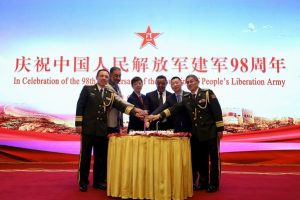
The Leaders of Africa and the United States have gathered over the week in the Angolan Capital, Luanda. The leaders of the two sides have expressed hopes to a growing trade and investment ties in the coming years.
The leaders’ summit has come at a critical time when the continent needs to boost its investment and trade ties with the world especially the US. It is important to take the opportunities of such forum to catalyze the continent needs for increased investment as well as fairness in reaping the final benefits from the bilateral trade.
According to the US Mission to the AU, until 2024 The Administration harnessed the dynamism of people from across the African continent and throughout the United States to expand prosperity on both sides of the Atlantic. In the past two years, the United States has supported and helped close 1,385 new deals for a total estimated value of $62.6 billion in new two-way trade and investment between the United States and African countries.
Among the major areas of investment included in the above projects is carried out through the U.S. International Development Finance Corporation (DFC) which discharged over $13 billion in more than 300 projects across 36 countries in Africa. Since the Summit, DFC has committed over $5.3 billion to new projects in Africa in key sectors such as energy, healthcare, infrastructure, mineral resources, and support for small businesses, the Missions information indicates.
In addition, the U.S. Trade and Development Agency (USTDA) has funded 24 project preparation activities to advance the implementation of over $7 billion in digital connectivity, clean energy, and healthcare infrastructure projects on the continent. In 2024, USTDA arranged 10 reverse trade missions and workshops focused on regulatory convergence for healthcare products, transportation, green hydrogen development, cybersecurity, methane abatement, and sustainable energy, connecting African public and private sector representatives with the latest U.S. technologies, services, and financing solutions.
Since 2022, the Export-Import Bank of the United States (EXIM) has strengthened partnerships across Africa, approving approximately $4 billion in authorizations for sub-Saharan Africa. This includes transactions across a wide variety of sectors including two of the largest renewable energy projects in EXIM’s history, aircrafts, civil works infrastructure, and radio equipment.
In fiscal year (FY) 2023, the EXIM Board of Directors approved a $281 million transaction to support the export of several Boeing 737 MAX 8 aircraft to Ethiopian Airlines Group. This transaction supported 1,600 U.S. jobs across Indiana, North Carolina, and Washington. In FY 2024, the EXIM Board of Directors approved an additional transaction of more than $456 million for Ethiopian Airlines for the purchase of five Boeing aircraft, supporting an estimated 2,200 new U.S. jobs in North Carolina, Ohio, and Washington.
A landmark initiative in the US Africa trade and investment links is the AGOA. The initiative has helped boost the reciprocation of trade by availing quota and tariff leverages for diverse products and items from Africa. This has helped the developing continent maximize its foreign currency earnings as well as enhance its production capacity.
No matter how the us could be competent trade partner it is still vulnerable to competition from other global giants like China, Turkey, India and Japan among others. It has to recalibrate its trade and investment activities with Africa so as to maintain its economic present in the developing continent that is attracting the attention of the world.
In the last couples of decades, Africa has been working strenuously to boost its trade and investment ties with economic giants of the world. Accordingly it has been facilitating its trade and investment with China, Japan, India, Turkey …ect. Through the bilateral platforms it was able to pave the way for the inflow of more trade and investment to the continent.
Accordingly, Africa is able to enjoy investment on infrastructure, manufacturing industry from the Asian partners.
Indeed trade and investment is vital and priority area of economic relations between countries. Yet in order to ensure the sustainability the relations it is also important to give due attention to durable areas of investment especially on infrastructure. Africa is a developing continent that needs more investment on transport, industry, energy, telecom and other fundamental sectors of the economy. Hence, it needs more investment in these fields to rapidly catch up with the rest of the world.
As leaders gather in the continent, they should take the occasion as a vital juncture to fix decade’s old concerns and seek lasting solution. For instance, just as AGOA has been vital in driving the continents production sector, it must be kept up until it builds up its capacity. It must also be free from political preconditions that are set as factors for eligibility. In the same way, the US should limit the tariff levied on the countries of the continent that have the possibility to affect the trade.
It is important to give due attention to the issues of paving the way for the continent to reap fair return from its mineral resources which are the major items in the trade. Especially African leaders should attain pivotal deal in making sure that Africa benefits from the exploration and development of the critical minerals that are the primary areas of attention in global energy transition agenda.
Furthermore, it is important to raise the issue of settling the long overdue dialogue over climate financing which has the capability to support the continent economically. Advancing the Africa’s interest in harnessing its potential in clean and green energy could help address multiples of problems that beset its economy.
Editor’s Note: The views entertained in this article do not necessarily reflect the stance of The Ethiopian Herald
BY ZEKARIAS WOLDEMARIAM
THE ETHIOPIAN HERALD FRIDAY 27 JUNE 2025




